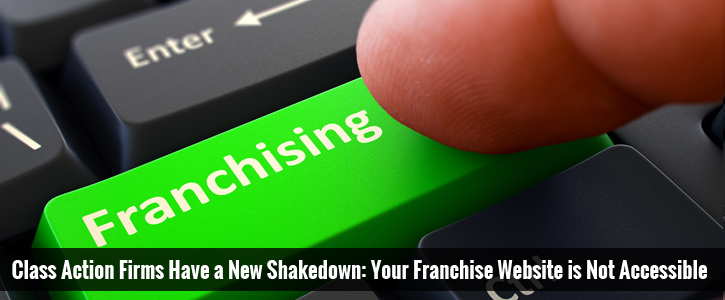Class Action Firms Have a New Shakedown: Your Franchise Website is Not Accessible

A plaintiffs’ class action firm based in Pittsburgh, Pennsylvania has discovered a new shakedown method, and it’s targeting franchisors. The firm has sent numerous demand letters on behalf of unnamed and unidentified plaintiffs and demanded settlements, which include an award of attorneys’ fees. The letters primarily demand that the receiver overhaul its website to increase accessibility for the disabled.
This demand rests on the Americans with Disabilities Act (the “ADA”), a federal law requiring all private places of accommodation to reasonably modify their businesses in order to avoid discriminating against those with disabilities. In determining what a “reasonable modification” is, courts will generally balance the cost of the modification and the ability of a particular business to bear that modification. The law is still out on how the ADA actually applies to webpages, though the Department of Justice—the agency tasked with enforcing the ADA—plans to release guidelines in 2018 detailing the requirements for compliance. The guidelines will likely require that websites be compatible with “screen readers” for the visually impaired, and perhaps contain close captioning for videos.
Until then, businesses with an internet presence operate in a legal grayzone. Major players, such as Netflix and Target, have already faced lawsuits based on the ADA. Target settled with a class of plaintiffs for $6,000,000 and an agreement to revamp their website. The 9th Circuit Court of Appeals ruled that Netflix was not subject to the ADA, yet a U.S. District Court in Massachusetts held that it was. Netflix subsequently entered into a settlement, agreeing to make adjustments to accommodate the hearing impaired.
It seems this class action firm has begun winding its way through the internet, looking for potential defendants. Possibly more firms will follow. As we’ve seen, they have targeted franchised businesses and recently filed scores of cases based on similar claims. These cases likely constitute a fraction of the demand letters this firm has actually sent out.
At least one franchisor, Mazzio’s Italian Eatery, has taken to the offensive and challenged one such demand letter, claiming that it could not be liable under the ADA in absence of a clear standard. Mazzio also claimed that the firm may have made fraudulent references to nonexistent clients. The firm immediately backed down from Mazzio’s challenge, and the case was dismissed within two days. Unfortunately, the dismissal of the cause removes any opportunity for a court to clarify the ADA for many moving forward, including similarly-situated brick-and-mortar franchises.
Clarity should come in 2018, when the Department of Justice releases its guidelines. At that point, franchisors will likely have to update their websites to make them ADA complaint. Until then, be wary of these potential ADA shakedowns. We will continue to watch this issue as it develops.
Back



